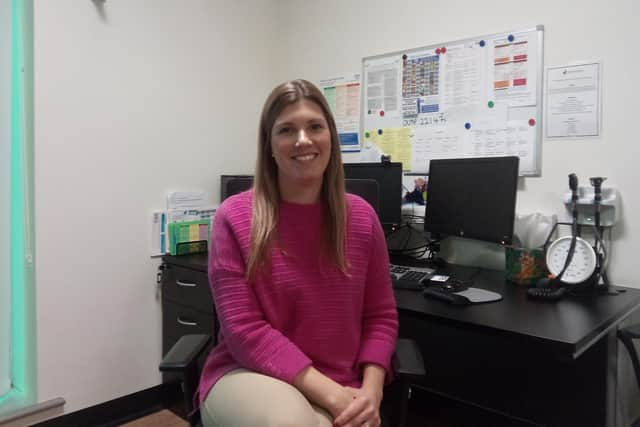GPs under pressure as demand for appointments reaches almost half a million a month in Leeds
and live on Freeview channel 276
Approaching half a million appointments are made per month - yet there are only the equivalent of 482 full time GPs in our local practices - and with winter being the busiest period, Emma Ryan looks at whether we are heading for a doctor disaster.
A local Leeds GP warns that more and more demands are being made on GPs who have just a ten minute allocation to treat each patient they see.
Advertisement
Hide AdAdvertisement
Hide AdIn the latest figures that the Leeds Clinical Commissioning Group (CCG) has, there were 402,906 GP appointments made across the city in September. The following month that had risen by more than 70,000 appointments to 473, 897.


And with the busiest time of year for the NHS still to kick in she says the pressure is about to be ramped up.
Doctor's day
Dr Sarah Forbes of Oakwood Lane Medical Centre said a GP session starts at 8am and finishes at 6pm - on paper.
She said: “You will find there are cars in the car park after 6pm - they are GPs. People wonder what does a doctor do between 1pm and 3pm but there are 14,000 patients here so we do paperwork, blood test results, phone calls, home visits, referrals and updating records.


Advertisement
Hide AdAdvertisement
Hide Ad“Some jobs you go for lunch. I don’t know anybody who doesn’t eat at their desk while they are working.”
The 10 minute time slot allocated per appointment just isn’t enough she said which leads to delays for patients and a relentless day for doctors.
“A face to face appointment is meant to be ten minutes but there are patients that will need longer for complex medical needs, patients whose first language is not English and you need a translator and mental health appointments, ten minutes is not enough.
“You have to balance that with the number of patients that you get through in a day.
Advertisement
Hide AdAdvertisement
Hide Ad“If you do a certain number of hours you get to the point where your empathy is less and that is not what you want. You go into this [profession] because you absolutely care and want to listen to what people are saying.”
And it is about to get worse she warned.
“When you look at our data, winter is statistically tough. From summer, you know that demand goes up, we can see that in our appointments.”
Statistics
In December 2018 there were 358,451 appointments but, the CCG says, that takes into account surgeries being closed or on reduced hours over Christmas and people being away but by January 2019 the figure was back up to 422, 325.
In February, the shorter month allowed for the 388, 798 patients but by March 2019, appointments had topped 409,000.
Advertisement
Hide AdAdvertisement
Hide AdHowever, the NHS says that 40 per cent of appointments made with GPs could be solved by other professionals such as pharmacists, over the counter remedies or the 111 NHS advice helpline and Dr Forbes claims that many cases GPs are faced with could be dealt with by using “common sense”.
Sick note culture
“There is the demand and the expectation of the public and what you are able to deliver. Some of what I am doing - it requires an adult with common sense.
“Ten years ago people had extended family they could ask. If a child was vomiting there would not be the same knee-jerk reaction to ring the doctor.
“There has been a change in behaviour in the ability to manage minor illnesses. We [GPs] have become the place where people come when life is difficult. We tend to be the first port of call.
Advertisement
Hide AdAdvertisement
Hide Ad“Trouble at work, home is a massive part of our job. Even disputes at work, People’s lives are tough and they want medication or something that will make it better. It is hard to be the keeper of sick notes.”
Winter Health Advice
The NHS says that 40 per cent of health complaints made at GP appointments can be solved without the need for an appointment.
Some of the most common illnesses which prompt people to see a GP are colds, chest infections and winter vomiting bugs but there is nothing that can be prescribed.
Dr Sarah Forbes says though that a whole host of patients don’t understand antibiotics won’t make it better.
Advertisement
Hide AdAdvertisement
Hide AdAs part of the Yorkshire Evening Post’s Winter Health series she highlights some of the common illnesses that can be self-medicated to help alleviate pressures on GPs.
She explains: “If you have a sore throat, ear-ache or a cough it is likely to be viral and no antibiotic is going to make that go away. Stay at home, keep well-hydrated, stay warm and have paracetomol.
“Don’t send kids to school if they have diarrhoea and vomiting or don’t go to work. That is a genuine reason to not go because you spread the bug around.
“If someone has tonsillitis, a high temperature, unable to eat and drink - that is bacterial.”
Advertisement
Hide AdAdvertisement
Hide AdOther long standing health conditions can be made worse by cold and damp weather and she advises patients to make sure that they are stocked up with over the counter and their prescriptive medicines.
She added: “Along the same lines of coughs and colds people have exacerbations of breathing problems like asthma and Chronic obstructive pulmonary disease (COPD).
“People with respiratory illnesses, be ready for winter and have you got an emergency plan? Do you know what to do if you need to use your blue inhaler, if your chest feels tight or you start with a cough?
“If you have antibiotics as a care plan, start taking them and that hopefully prevents hospital admissions before it gets so bad.”
Advertisement
Hide AdAdvertisement
Hide AdHowever, from society pressures to isolation, Dr Forbes says mental health is a big issue on the winter medical agenda.
“We see an increase in cases and some of that is the impact of Christmas. It is a difficult time for people because of lack of money. This surgery is in a deprived area and Christmas is tough for people. They feel a societal pressure.
“While the depression might be low level and does not need medication or a referal, people just want to come and talk so we are addressing that.
“We have mental health workers in the surgery so that reception staff can sign post from the front door to more appropriate support staff and we also advocate anything that can help mental health such as music, yoga or tai chi.”